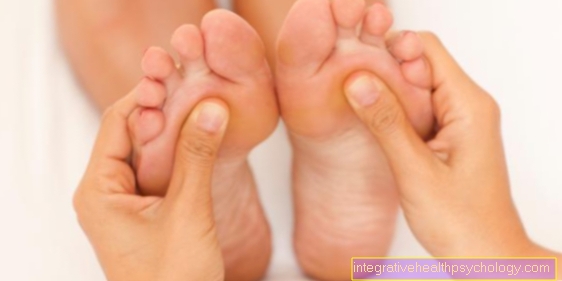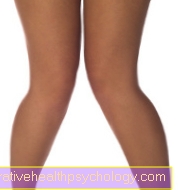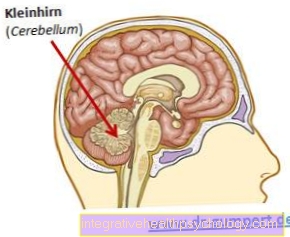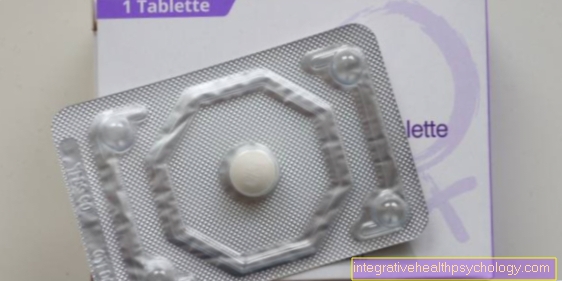Stomach cramps with diarrhea
Synonyms in a broader sense
Stomach pain, abdominal pain
English: stomach cramps
General
Stomach cramps and diarrhea are first of all Symptoms. These can occur separately from one another or together and Expression of various diseases be. Most of these diseases, even if they seem uncomfortable or bothersome, are harmless and there is not necessarily anything to worry about. However, under certain circumstances, which are discussed in more detail below, it is advisable to consult a doctor.

Having stomach cramps are common stabbing or pulling pain in the area of the upper abdomen understood that increase and decrease in intensity. Between the individual pain episodes there can sometimes be absolute freedom from symptoms. The term “stomach cramp” is somewhat misleading because the corresponding pain symptoms can also come from parts of the intestine. As diarrhea in adults is a stool frequency of More than three unformed (liquid) bowel movements per day with a total stool weight of over 250g.
Causes of stomach cramps with diarrhea
Stomach cramps with diarrhea occur as Symptom complex in many different diseases. One observes this most often in the case of viral or bacterial infections of the digestive tract. Virus-related diarrheal diseases occur epidemically in the winter months in particular and primarily affect community facilities such as schools, kindergartens, nursing homes and hospitals. A common viral agent of this type is that Norovirus, which annually leads to a large number of cases of infectious diarrhea. The viruses are usually transmitted via fecal-oral smear infections, by Inadequate hand hygiene after using the toilet be favored. Contaminated fruit or vegetables are also often suspected of spreading the disease.
Also bacteria can cause stomach cramps and diarrhea. Common pathogens of this type are Salmonella, Shigella and Campylobacterwhich enter the human digestive system via infected food and cause inflammation.
As gastritis It is called inflammation of the lining of the stomach that is either by bacteria, drugs, one Autoimmune disease or through triggered chronic alcohol abuse can be. With inflammation of the gastric mucosa, stomach cramps occur frequently, occasionally accompanied by diarrhea. The symptoms are somewhat less common Gastric ulcer based on which sometimes on the ground a chronic gastritis can arise.
Stomach cramps and diarrhea are becoming more common Food intolerance again Lactose or gluten intolerance associated. Attempts to omit the suspected foods and a visit to the doctor can help clarify the triggering factors.
Still in proportion Rare, but of increasing relevance are the so-called chronic inflammatory bowel disease (IBD), to them Crohn's disease and Ulcerative colitis counting. They are associated with sometimes considerable gastrointestinal cramps and a greatly increased stool frequency, which can reach a maximum of 25 stool movements per day during an acute flare-up of ulcerative colitis. A chronic inflammatory bowel disease is always suspected if Episodes of stomach cramps and diarrhea recur over a long period of time.
If the spasmodic pain is concentrated in the upper right abdomen and occurs after eating, then gallbladder inflammation is likely.
If, after an intensive search, no organic cause for the appearance of the symptoms is found, irritable bowel syndrome can be assumed if the symptoms persist. This is often assigned to psychosomatic diseases, i.e. those diseases in which stress of various kinds leads to physical syndromes.
A malignant disease such as stomach cancer is only present in rare cases.
Therapy of stomach cramps with diarrhea
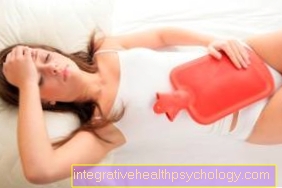
Unfortunately there isn't the means to Stomach cramps with diarrhea to treat. The therapy of Stomach cramps can always only after in-depth Diagnosis start and then depends on the illness that caused stomach cramps.
With all possible causes that come into question, the Stomach Accompany the specific therapy so as not to expose him to additional stress. These include a healthy and balanced one nutrition (for more details see prophylaxis) and avoiding stressful situations. Warm compresses or a stomach-soothing tea (for example chamomile) can at least support the recovery. Massages or acupuncture are also possible for some sufferers.
Were the stomachcramps by a Appendicitis caused, it may be necessary to use the appendix surgically removed to provide pain relief and prevent breakthrough.
A bad stomach and diarrhea are very easy to treat. If you have eaten something that was no longer good, or if you could not tolerate a part of the meal, it is usually sufficient to take a corresponding part for two days diet carry out (this means light food in the form of rusks and tea and of course renouncing the triggering substance). But should be a real one Food poisoning present, it may be due to violent Diarrhea It may be necessary to give the person more fluids again, which can take the form of an oral rehydration solution (water, electrolytes and glucose) or an infusion. If the food poisoning is caused by the pathogen, you should also use Antibiotics be treated.
Flatulence can usually be managed well with home remedies. Massages and locally applied heat, for example in the form of a hot water bottle, often already show a clear improvement in symptoms. In addition, naturally flatulent foods (such as Cabbage, beans, watermelon or Sugar substitutes) be avoided.
The Irritable bowel syndrome is in principle harmless and therefore does not necessarily have to be treated if the patient's suffering is not too great. Treatment is often not indicated for the reason that no specific point of attack can be established. In some cases, however, depending on the type of irritable bowel syndrome, laxatives or bowel stimulants may improve the condition. Since psychological factors do not play an insignificant role in the development of irritable bowel syndrome, psychotherapy can also be useful.
Gastrointestinal infections caused by viruses usually heal on their own after two to three days and therefore usually do not require any therapy. Bacterial infections can be treated with antibiotics under certain circumstances, although these should only be used in severe cases, since the infections are usually not dangerous and self-limiting and the unnecessary administration of antibiotics leads to unwanted resistance. In the case of small children and the elderly, you should also always check that the fluid balance is through Vomit and diarrhea is not impaired too much and, if necessary, resort to fluid replacement.
Since with one Inflammation of the stomach lining Especially the high acidity of the gastric juice plays a role, is treated here with drugs that inhibit gastric acid production (either so-calledProtonon pump inhibitors, for example omeprazole, or histamine-2-receptor blockers, for example ranitidine). When the cause of gastric mucosal inflammation is the infection with Helicobacter pylori this should be eliminated with the help of so-called "eradication therapy", which consists of the joint administration of a proton pump inhibitor and two antibiotics. The same therapeutic approaches apply to the presence of a gastric ulcer.
The therapy at Stomach cancer depends on how far the cancer is already advanced. In some cases the tumor completely removed with one operation. If this is not possible or unsuccessful from the start, there are also options for chemotherapy or for radiation therapy or a combination of both. Less commonly used treatments are laser therapy or immunotherapy (which are used to activate the body's defenses to fight cancer). In addition, the diet may also have to be changed.
Concomitant symptoms
As already mentioned, stomach cramps and diarrhea occur in the context of many diseases. Consultation with a doctor is not recommended in all cases, but there are some accompanying symptoms that deserve attention. Are the complaints about you? long period away and go with a pronounced Appetite and weight loss hand in hand, should one medical evaluation to rule out a serious illness that may require treatment.
The Vomiting blood or coffee grounds-like stomach contents is an absolute emergency. Immediate hospital treatment is indicated. That too The withdrawal of very dark, tarry stool or fresh blood makes medical diagnosis and treatment essential.
Is the Belly tight as a board and / or high fever, the victim should also seek medical treatment immediatelyto identify and treat a potentially life-threatening illness in good time.
Common and less threatening accompanying symptoms if you have stomach cramps and diarrhea Nausea, vomiting, and moderate fever. A slight loss of appetite without significant weight loss is also considered to be tolerable. In most infectious gastrointestinal inflammations, these symptoms appear accompanying.
Stomach cramps with diarrhea and fever
The occurrence of fever in connection with stomach cramps and diarrhea means that the body increases its temperature to defend itself against pathogens and thus speaks in the specific case for the spread of infectious agents or their toxic substances in the body - in this case from the gastrointestinal Tract through the blood to the rest of the body.
As a result, this constellation of symptoms can occur in particular with infectious causes of stomach cramps and diarrhea, e.g. Gastrointestinal infections from noroviruses or food poisoning.
If a fever occurs, it is generally always advisable to consult a doctor - especially if the person concerned is a child!
The medical professional can then use examinations such as taking a blood sample, clarify the cause of the symptoms and, if necessary, initiate adequate therapy.
In addition, antipyretic medication should be taken before the doctor's visit (as long as there are no contraindications; please refer to the package insert) as well as the use of well-known "Home remedies"To lower the fever, e.g. moist calf compress, recommended.
Read more on the subject at: Fever and diarrhea
Stomach cramps with diarrhea and gas
The most obvious explanation, because it is the most common cause of a combination of the symptoms of diarrhea or stomach cramps and flatulence, is so-called irritable bowel syndrome, which affects 10 to 20 percent of adults in Germany.
The diagnosis is often difficult, which is why it is made late or not at all. The symptoms mentioned often come along Constipation, nausea, or bloating added.
The exact cause of irritable bowel syndrome is still unclear; food intolerance and low-fiber diet are assumed to be risk factors.
Because the cause is not exactly known, the therapy is also aimed at alleviating the symptoms, not at the causal elimination of the trigger: there will be anticonvulsant drugs or home remedies (Chamomile tea or heat treatment) recommended, as well as sufficient Move and Relaxation as well as the renouncement of food, after the consumption of which the complaints occur more frequently.
Which food it is, however, differs from person to person, which is why personal initiative is required when observing the triggering food. Common triggers are Coffee, alcohol and high-fat foods, but also Dairy products and raw fruit.
Irritable bowel syndrome must always be clarified by a doctor in order not to overlook other, more dangerous causes of the symptoms.
Other possible causes for this constellation of symptoms are one Fructose intolerance, Lactose intolerance (see above) and Gluten intolerance (see above) or infectious diseases.
The latter can be divided into acute infections like the gastroenteritis and chronic diseases like the Crohn's disease or the Ulcerative colitis.
In order to get to the bottom of the cause, the doctor should first draw up a detailed anamnesis of accompanying complaints, medication intake, eating habits and previous illnesses. This should be followed by a physical examination of the abdomen, as well as laboratory tests, Ultrasonic and possibly roentgen.
If there is still uncertainty, there is also the possibility of one Colonoscopy or one MRI of the abdomen or CT scan.
Stomach cramps with diarrhea and nausea
The Most digestive disorders are accompanied by nausea and vomiting. The nervous system of the stomach and intestines is very sensitive to inflammatory processes and disorders of the normal digestive process. The body tries potential disruptive factors first by increasing the intestinal activity and the secretion of water into the intestine (diarrhea) and by contraction of the stomach (vomiting) to fix. Ingested toxins or pathogens are very effectively removed from the digestive tract and normal activity can be resumed after a recovery phase.
Vomit is a very unselective response to gastrointestinal disorders. In addition to the ingestion of poisons or pathogens, vomiting occurs triggered by a variety of abdominal disorders. This also includes, for example Inflammation of the gallbladderthat does not directly affect the stomach. Nausea and vomiting are common symptoms associated with stomach cramps and diarrhea and do not necessarily need to be examined by a doctor. If that General condition of the person affected by nausea highly limited is, are herbal supplements or so-called antiemeticpreventing vomiting drug, how Dimenhydrinate, in every pharmacy without prescription available.
Stomach cramps with diarrhea and blood in your stool
Blood in the stool is a Alarm sign, which one A visit to the doctor is unavoidable power. Well visible, red bloodwhich is placed on the chair, mostly comes from bleeding hemorrhoidswhich are usually harmless and easy to treat. Still one should thorough examination for other possible sources of bleeding respectively. This also includes malignant diseases like the Colon cancer, whose prognosis can be significantly improved through early detection and treatment.
Blood is not always clearly visible in the stool. Also a rather thin, deep black, tarry stool is mostly on one Bleeding from the digestive system which in this case is mostly to be assumed in higher sections of the gastrointestinal tract, i.e. closer to the mouth. Here is one too urgent clarification for the presence of a bleeding stomach or small intestine ulcer required.
Invisible blood called occult blood in stool, can in the context of colon cancer occur. Here comes, usually from the age of 50, the Hemoccult test for use. This test can detect occult blood in the stool using a simple test system.
Stomach cramps with diarrhea during pregnancy
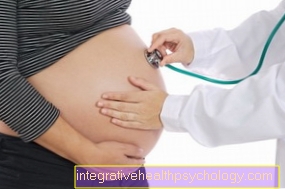
Along with nausea, diarrhea and especially stomach cramps are among the most common unpleasant side effects of pregnancy.
The reason for the occurrence of the symptoms, especially in the early stages of pregnancy, is the hormonal changes associated with pregnancy, which also affect the hormonal balance of the gastrointestinal tract.whirl around“.
As the pregnancy progresses, the growing child and the displacement it creates in the mother's abdominal cavity also contribute to the symptoms. Especially when the child moves, cramp-like pain in the stomach area can occur.
If the spasms occur in the pregnant woman mainly during her own movements, such as coughing or standing up, the cause is usually the increasing stretching of the mesenteries, i.e. the straps of the abdominal organs.
Finally, when the pregnancy is advanced, labor can be misinterpreted as stomach cramps.
In general, stomach cramps caused by pregnancy are usually uncomfortable, but harmless.
The intake of medication should always be considered with caution during pregnancy, but with minor complaints that do not last too long, chamomile tea and warmth often work wonders.
Nevertheless, if the occurrence occurs more frequently, especially if diarrhea or fever occurs, a doctor should be consulted so as not to overlook other possible causes such as gastrointestinal infections or infections of the gastric mucosa or the pancreas.
Read more on this topic at: Diarrhea in pregnancy
Stomach cramps with diarrhea and after eating
Gastrointestinal complaints after eating such as Stomach cramps and diarrhea often suggest that a food component is the cause.
It may be that food contaminated with pathogens was consumed, which is a Food poisoning triggers.
These are to be compared with Food intolerance or allergies, among which the Lactose intolerance or the Celiac disease (Gluten intolerance) are among the most common manifestations.
With both causes, the symptoms appear with a certain delay, which can range from minutes to hours.
But not only food components are among the possible causes. If the symptoms occur after every food intake, regardless of the food contained, this is more indicative of a functional disorder of gastrointestinal mobility.
Other less common but not harmless causes of food-dependent stomach cramps can be Stomach ulcers or Gallstones be.
In these cases, the symptoms appear immediately after eating, without delay.
Gallstone-triggered Stomach cramps can be distinguished from pain caused by gastric ulcers, as they are more on the right than in the middle of the upper abdomen and especially after fatty food enter.
Another cause of stomach problems, especially in combination with flatulence, after eating can be that described below Irritable bowel syndrome be.
Please also read our extensive topic: Stomach cramps after eating


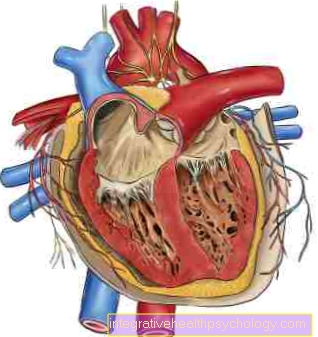

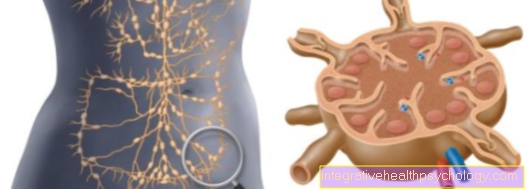
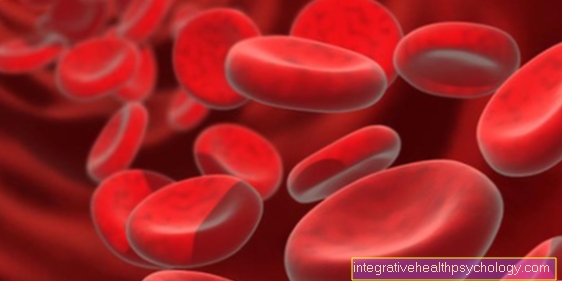



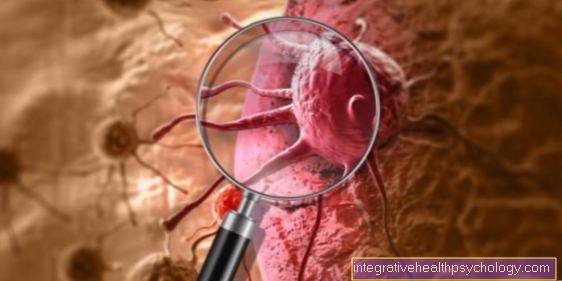



.jpg)
